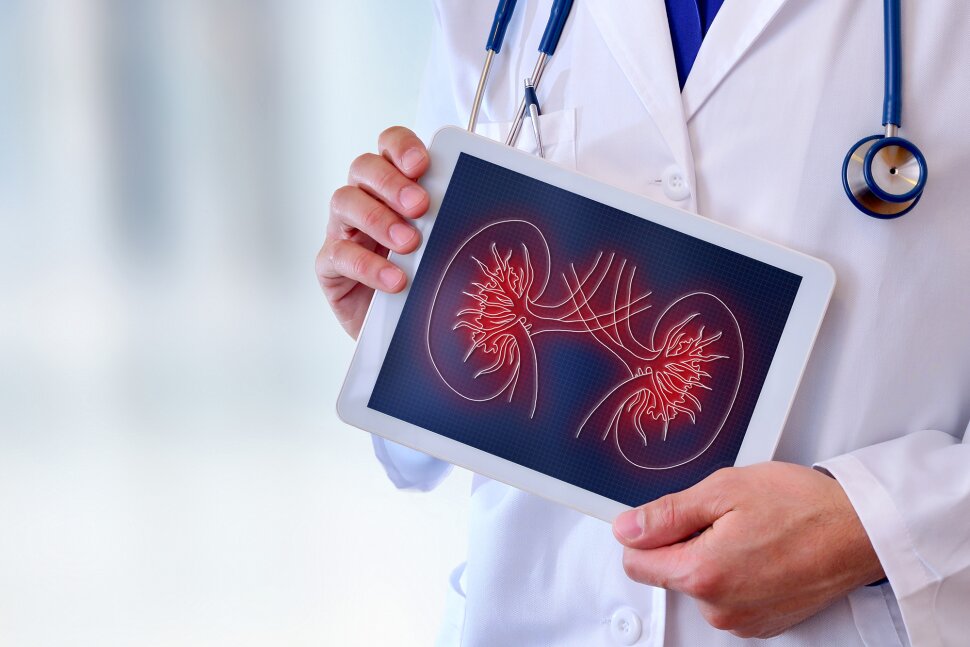Chronic kidney disease (CKD) is an emerging health problem worldwide and retinal health has a structural, developmental, and genetic pathway with the kidney, making kidney and ocular diseases closely linked. Diabetic retinopathy (DR) and nephropathy are typical complications of diabetes. The prevalence of CKD and DR increases proportionally to the disease duration in Type 2 Diabetes. Additionally, as CKD and DR share common risk factors such as smoking, poor glycemic control, systolic hypertension, or dyslipidemia, the development of DR may predict the development and progression of CKD.
In India, over 62% CKD diseases in India are due to diabetes and Diabetic retinopathy, affects 18% diabetic population in urban India2. The common thread between CKD and Diabetic retinopathy is the damage caused by high sugar levels to small blood vessels in the body. Patients with CKD are also at a higher risk of age-related ocular diseases. Age-related ocular diseases such as cataract, retinopathy, glaucoma and age-related macular degeneration, are leading causes of blindness in middle aged and elderly adults.
Dr. Ganesh Pillay, Medical director and consultant, ASG Eye hospital, “The various stages of Diabetic Retinopathy very closely correlate to the stages of CKD, so much so that, most often patients with DR, have an undiagnosed form of CKD. Many times, patients with latent or asymptomatic CKD, are present with DR and its complications. Hence as an ophthalmologist, I do refer the patient to a physician or a nephrologist whenever I see patients with advanced DR, AMD or Hypertensive Retinopathy.”
Dr. Mahipal Sachdev, medical director and chairman, Centre for Sight Group of Eye Hospitals said, “Like nature, the body is a network where everything is connected. Consequently, when one organ fails, other organs can be affected too. A number of studies suggest a strong link between eyes and the kidneys. They show that dialysis patients develop eye diseases more often than people at the same age who do not suffer from kidney disease. Therefore, patients can do a lot to prevent severe problems by being aware of these risks and acting accordingly with regular check – ups and efficient treatment adherence.”
Keeping Your Eyes Healthy with Kidney Disease
-
Check your eyes regularly
Since kidney diseases can affect your eyes, it’s essential to get regular eye exams. Certain eye diseases do not have symptoms in the early stages. The only way to diagnosis eye conditions early on is through a regular eye check-ups, which helps early detection of eye problems and avoid further complications like vision loss.
”Eye problems and vision loss are two to seven times higher in patients with CKD, mainly because patients who develop CKD, generally have long term uncontrolled or poorly controlled systemic conditions, like hypertension, diabetes, high cholesterol, heart disease, which predisposes them to several eye diseases like AMD, cataract, glaucoma, eye stroke. Therefore, its important for frequent check ups with an ophthalmologist and to have a diet rich in anti-oxidants and regular physical exercises like walking and yoga.”, added Dr. Pillai.
-
Symptoms and syndromes
It’s important to watch for warning signs for eye disease. If you have kidney disease, you are at an increased risk of vision loss. If you develop any of the following symptoms, see a doctor immediately:
- Flashing lights
- Sudden changes in vision, including blurred vision or vision loss
- Sudden floaters in the eyes
-
Control High Blood Pressure & Glucose Levels
High blood pressure and diabetes can go hand-in-hand with kidney disease. Chronic hypertension can have a negative effect on your eyes, as can high blood sugar levels. Controlling blood pressure and your glucose levels are critical for both your kidneys and your eyes. Talk with your doctor to determine what your levels should be, how often to monitor your numbers, and how best to control them.
-
Quit smoking
Smoking is bad for both kidneys and vision. It increases the risk of eye problems, such as glaucoma and cataracts. There are several products and tools that provide effective ways to quit smoking, including nicotine replacement products and medications.
-
Follow Your Doctor’s Guidelines for Diet, Exercise & Medication
Chronic kidney disease may include a variety of treatments, depending on the severity or stage of the disease. Treatment may include medication, lifestyle changes. It’s important to follow your doctor’s recommendations regarding your treatment plan. It is important to ensure that drugs taken for the eyes or for any other reason should be taken under supervision and in the proper dose. Kidney disease and kidney failure can affect how drugs work in your body, therefore, many drugs need to be a special dose for people with low kidney function or for those on dialysis.
World Kidney Day is observed on the 2nd Thursday of March each year with the primary objective of spreading awareness around the globe on the need for identifying kidney disease as a significant public health problem. Regular screening in high-risk group population helps in the early identification of the disease.

